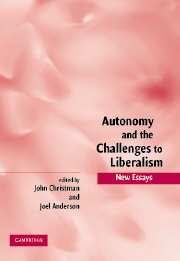Book contents
- Frontmatter
- Contents
- Contributors
- Preface
- Autonomy and the Challenges to Liberalism
- 1 Introduction
- PART I THE SELF: CONCEPTIONS OF THE AUTONOMOUS SELF
- PART II THE INTERPERSONAL: PERSONAL AUTHORITY AND INTERPERSONAL RECOGNITION
- PART III THE SOCIAL: PUBLIC POLICY AND LIBERAL PRINCIPLES
- PART IV THE POLITICAL: LIBERALISM, LEGITIMACY, AND PUBLIC REASON
- 11 Liberalism without Agreement: Political Autonomy and Agonistic Citizenship
- 12 The Place of Autonomy within Liberalism
- 13 Moral Autonomy and Personal Autonomy
- 14 Autonomy, Self-Knowledge, and Liberal Legitimacy
- Bibliography
- Index
14 - Autonomy, Self-Knowledge, and Liberal Legitimacy
Published online by Cambridge University Press: 02 December 2009
- Frontmatter
- Contents
- Contributors
- Preface
- Autonomy and the Challenges to Liberalism
- 1 Introduction
- PART I THE SELF: CONCEPTIONS OF THE AUTONOMOUS SELF
- PART II THE INTERPERSONAL: PERSONAL AUTHORITY AND INTERPERSONAL RECOGNITION
- PART III THE SOCIAL: PUBLIC POLICY AND LIBERAL PRINCIPLES
- PART IV THE POLITICAL: LIBERALISM, LEGITIMACY, AND PUBLIC REASON
- 11 Liberalism without Agreement: Political Autonomy and Agonistic Citizenship
- 12 The Place of Autonomy within Liberalism
- 13 Moral Autonomy and Personal Autonomy
- 14 Autonomy, Self-Knowledge, and Liberal Legitimacy
- Bibliography
- Index
Summary
In the Enlightenment tradition of the justification of political authority, institutions of state power are seen as legitimate only if such institutions can be freely supported by those living under them. Liberal legitimacy, then, assumes that autonomous citizens can endorse the principles that shape the institutions of political power. The conception of autonomy functioning in such a picture, moreover, requires that such citizens uniformly enjoy the capacity to rationally reflect upon and critically appraise their own values, moral commitments, and political convictions. In this way, political power is an outgrowth of autonomous personhood and choice.
This traditional understanding of political legitimacy has been challenged from any number of directions, most notably from those who charge that the picture of the autonomous person underlying the mechanism of authority is parochial, exclusionary, and in tension with the sought-for legitimacy it is used to support. In this last vein, it can be charged that the requirements of general support for principles of justice in a modern, pluralistic society are in tension with the assumptions concerning individual autonomy underlying that concept. For the problem facing liberal conceptions of justice and legitimacy is that political power can be seen as justified only when supported by autonomous citizens, but the requirements of autonomy, in many construals of that term, are too stringent to be met by the majority of citizens bound by political institutions.
- Type
- Chapter
- Information
- Autonomy and the Challenges to LiberalismNew Essays, pp. 330 - 358Publisher: Cambridge University PressPrint publication year: 2005
- 19
- Cited by

